India AnnamanthadooDonner Fellow
Civil Society Mechanism (CSM) for the UN Committee on World Food Security (CFS) My Donner Fellowship allowed me to work with the Civil Society Mechanism (CSM) for the UN Committee on World Food Security (CFS). The CSM is the largest international platform for civil society organizations working towards achieving the eradication of food insecurity and malnutrition. As a Donner Fellow with the CSM, I helped to author a report assessing national implementation and violations of the right to food around the globe, which will be presented at the CFS in Rome this October. The report is part of a larger effort by the CSM to hold member States—including Canada—accountable to their legal obligations to protect, respect and fulfill the right to food (under Article 11 of the International Covenant of Economic, Social and Cultural Rights). Specifically, my work involved analyzing international legal instruments, developing an updated normative framework of the right to food, researching specific examples of right to food violations (e.g. the situation in northern and indigenous communities in Canada), and collaborating with colleagues from around the world to write the report. In June, I had the opportunity to travel to the Food and Agriculture Organization of the UN in Rome (where the CFS is housed). While there, I participated in working group meetings with State delegates—an eye-opening experience that added global context to the struggle for the right to food in Canada. I am very grateful for the opportunity the Donner Fellowship gave me to explore my interests in food law! The insights I gained this summer reinforced why I decided to pursue law in the first place—to make meaningful global change. | 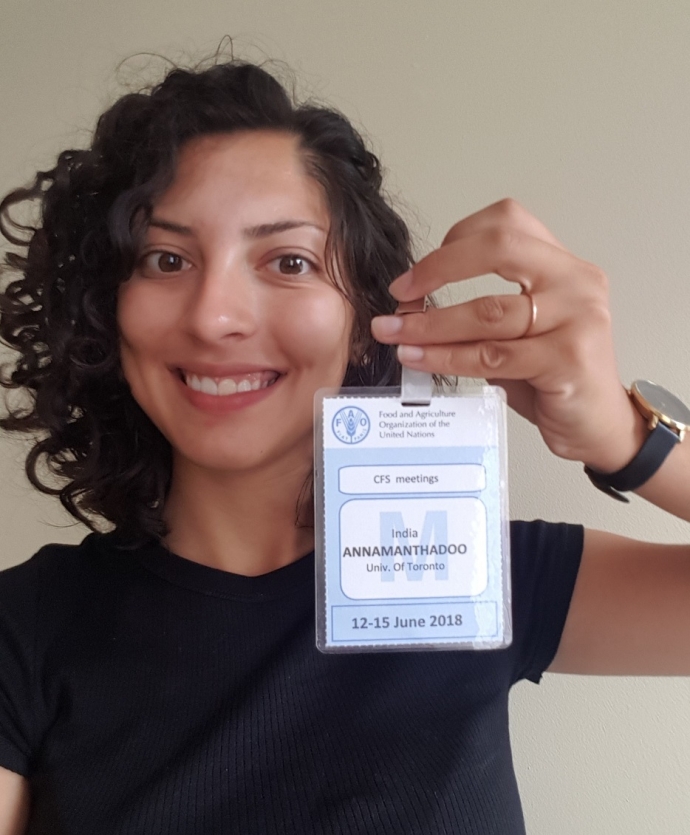
India Annamanthadoo |
Lily ChapnikDonner Fellow
Jewish Family & Child Services This summer I was privileged to work as a Donner Fellow at Jewish Family and Child Services. This organization serves many functions, however my role was within their capacity as a Children's Aid Society servicing the Jewish community of Toronto and the surrounding areas.
My project had two distinct parts: 1) Updating their child welfare manual to be in line with the newly implemented Child, Youth, and Family Services Act (2018), and 2) Writing a comprehensive guide to child protection court processes for Social Workers. I was also able, through the generosity of the lawyers, to shadow many court proceedings.
It was invaluable to me to gain this experience, both on the more policy-minded and practical sides of child protection law. I am grateful to the Donner Fellowship Committee for the opportunity and sincerely recommend the Fellowship to my fellow students. | 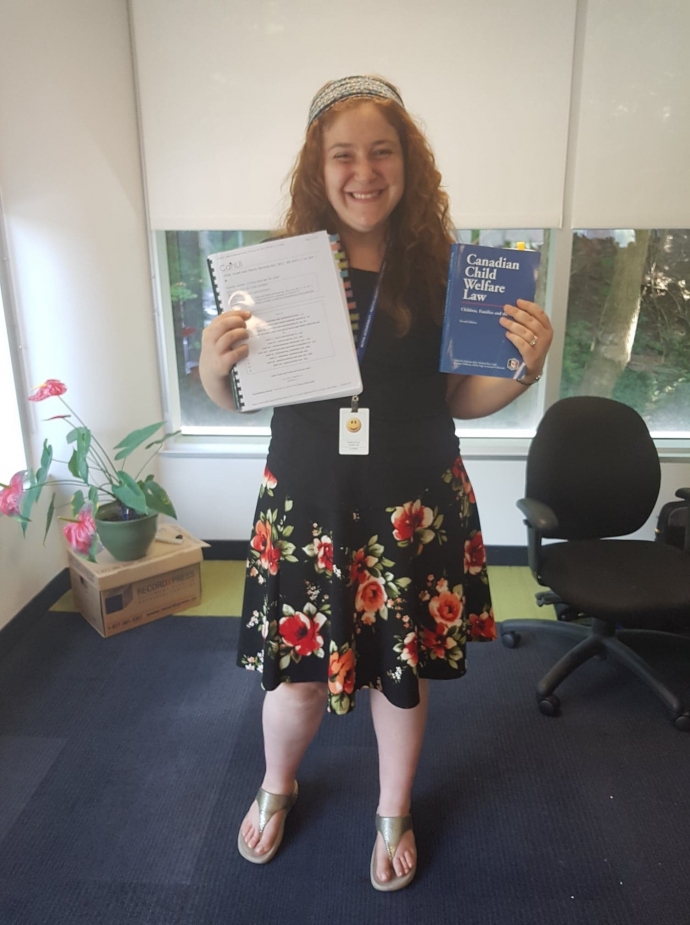
Lily Chapnik |
Sarah HelmerDonner Fellow
Industrial Accident Victims’ Group of Ontario This summer I worked as a Donner Fellow at the Industrial Accident Victims Group of Ontario (IAVGO) Community Legal Clinic. IAVGO is a not-for-profit legal clinic that offers free legal services to injured workers and their families. In addition to providing direct representation for individual clients, IAVGO engages in community education and law reform advocacy in the area of workers’ compensation. Since 2005, IAVGO has prioritized the cases of migrant workers. The clinic supports these uniquely vulnerable clients both through policy-based advocacy and through direct representation and advocacy alongside migrant workers. My role as a Donner Fellow involved research and clinical work focused on assisting migrant agricultural workers who have suffered human rights violations at work in addition to having sustained workplace injuries. The Fellowship position allowed me to undertake novel research for IAVGO, helping to bolster the clinic’s representation and advocacy strategies in migrant workers’ cases. My most significant project involved conducting research into State Immunity in the context of the Seasonal Agricultural Workers Program (SAWP). The SAWP is a Federal program based on bilateral international agreements with Mexico, Jamaica, and other Caribbean nations. It allows Canadian farmers to hire agricultural workers from these nations on a seasonal basis, on the condition that there be a deficit in Canadian workers willing and able to perform the work. In addition to screening and supplying available workers, the sending nations appoint Agents to represent the nation’s and workers’ interests while they are in Canada. In practice the Agents’ interests often conflict with the best interest of workers, which can lead to their complicity in violating workers’ human rights. Problematically, an Agent who infringes a SAWP worker’s human rights is presumptively immune from proceedings in a Canadian court as a representative of a foreign state. This area of law is governed by the State Immunity Act, which provides for certain exceptions to state immunity. My research focused on these exceptions in an attempt to discover whether there are any circumstances under which a foreign Agent could be successfully named as a party to a complaint under the Ontario Human Rights Code. As is so often the case in litigation, the answer appears to be “maybe.” I will be continuing at IAVGO as a credit student throughout the academic year, and hope to have the opportunity to see my research put into action on an appropriate test-case. My summer at IAVGO was of immense personal and professional value. The Donner Fellowship gave me the opportunity to cultivate high-level research skills and gain practical experience while developing specialized knowledge of the complex and fascinating issues affecting migrant workers. I am also thrilled to have been able to bring value to IAVGO and to the migrant worker community through my work as a Donner Fellow. My research, which would not have been possible without this funding, could lead to greater access to justice for migrant workers facing human rights abuses while working in Ontario. I am incredibly grateful to both the Donner Fellowship and IAVGO for this unique opportunity. | 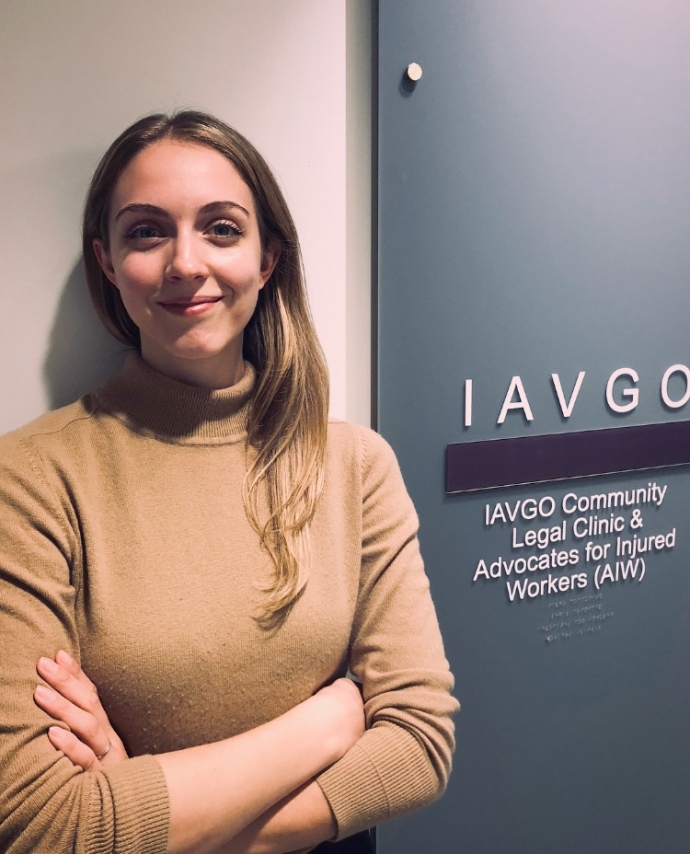
Sarah Helmer
|
| Erica McLachlan Donner Fellow
Canadian Civil Liberties Association
The Donner Fellowship provided the opportunity for me to work at the Canadian Civil Liberties Association (CCLA) for the summer. My desire to go to law school stemmed from my interest in non-profits and public interest work. Working with CCLA has been a wonderful experience in that regard. CCLA is an independent, non-governmental organization that advocates for the constitutional rights and freedoms of all people in Canada. They conduct their work in the courts, appear before legislative committees, and engage in public legal education. This summer, I worked with Cara Zwibel, who is the Director of the Fundamental Freedoms Program at the CCLA. My research project focused on the federal government’s approach to corporate social responsibility, particularly regarding Canadian companies operating abroad. It involved looking at the federal government’s policies surrounding the creation of the Canadian Ombudsperson for Responsible Enterprise and researching case law related to the topic. In addition to the project, I had many other opportunities to contribute to CCLA’s legal research and advocacy work. Through both my research, as well as daily conversations with colleagues and staff at the office, I learned a great deal about the range of civil liberties issues in Canada. My research included reviewing bills, comparing provincial legislation, and producing memos for interventions. The work that I prepared not only allowed me to improve my practical legal research and writing skills, but also gave me the chance to learn more about Canadian civil liberties issues and meaningfully contribute to the organization’s work. Overall, my summer as a Donner Fellow at CCLA was a valuable and enjoyable learning experience. In particular, the staff and students I had the chance to work with throughout the summer greatly enriched the experience. I am very grateful to both the Donner Fellowship and CCLA for giving me the opportunity to become involved in such interesting, important and timely work. | 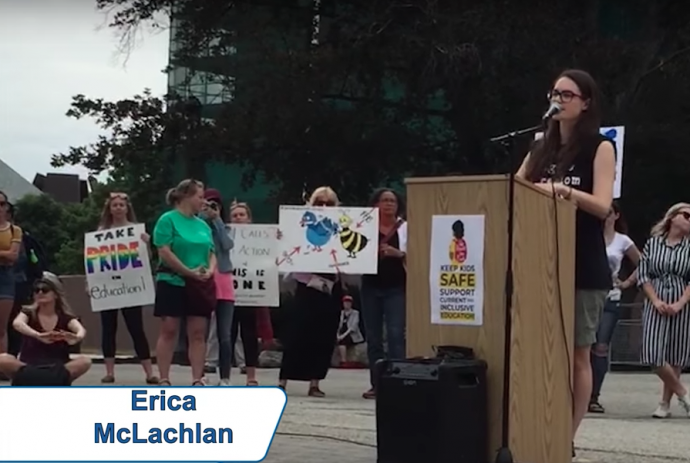
Erica McLachlan |
Amara Mclaughlin-HarrisDonner Fellow
Law and Mental Disorder Association With the support of the Donner Fellowship, I spent my summer working with the Law and Mental Disorder Association (LAMDA). LAMDA is a national, independent organization founded by experienced mental health litigator, Anita Szigeti, in 2017 as an association of like-minded lawyers whose clients are affected by mental health and addiction issues and has its mission in advancing the rights and freedoms of people with mental health and addiction issues in Canada’s criminal and the civil mental health systems. LAMDA aims to work through education, in the courts, and by political engagement. My work with LAMDA included research and writing for appellate factums, completing research memos on issues affecting the rights of inpatients in psychiatric hospitals, laying the groundwork for a website, developing a logo and document templates, and preparing for inquests. This experience was a total, welcome and invaluable immersive education in the issues surrounding mental health law systems and continues to provide me with opportunities to do further mental health advocacy work. | 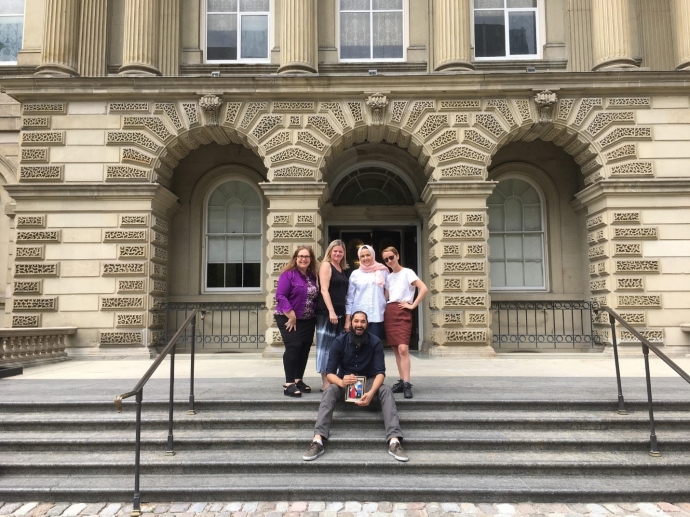 Amara McLaughlin-Harris on the right: The team at the Court of Appeal Amara McLaughlin-Harris on the right: The team at the Court of Appeal
|
Alexandra Robertson Donner Fellow
Canadian Environmental Law Association Through the Donner Fellowship I had the opportunity to work this summer at the Canadian Environmental Law Association (CELA) in Toronto. Founded in 1970 as a nonprofit, public interest organization, CELA uses existing laws to protect the environment and advocates for environmental law reform. As a specialty legal clinic funded by Legal Aid Ontario, CELA’s work is focused on low-income individuals and disadvantaged communities. My main project at CELA was public legal education (PLE) in Northern Ontario. After doing some initial research on environmental issues in Northern Ontario and strategies for effective PLE, I began making connections with community organizations and non-profits in Thunder Bay and Timmins. I worked with these groups to get a better sense of the environmental issues that most affect their communities, to figure out the logistics for the PLE presentations, and get the word out about the event to the broader public. With feedback from these community groups and staff at CELA, I prepared a presentation that spoke to the environmental issues people care about the most and explained how residents could use environmental laws in Ontario to become more involved in the decisions that impact them. After months of preparation, we went to Thunder Bay and Timmins in early August. We had a great turn out in both cities and we were very pleased by all the questions residents had about environmental legal issues in their community. Researching environmental issues in Northern Ontario and preparing the presentations provided me with a great deal of insight into environmental legal issues across the province. I also learned a lot more about the various environmental rights we enjoy as residents of Ontario, and the various ways that we can become involved in environmental decision-making. To advertise the presentations I reached out to a number of media organizations and gave several interviews on the work we were doing, including to the CBC Radio show “Up North” and CTV Northern Ontario. I also prepared a presentation on the PLE project to CELA’s board at their Annual General Meeting. In addition to the PLE work, I had the opportunity to draft legal memoranda on a number of environmental and planning issues in Northern Ontario, which also provided me with deeper insight into these two areas of law. All in all, the Donner Fellowship was a fantastic experience that allowed me to further my knowledge of environmental law, learn more about Northern Ontario and northern issues, and travel to an area of the province that was completely new to me. I am very grateful to both the Donner Civic Leadership Fund and to CELA for this opportunity. | 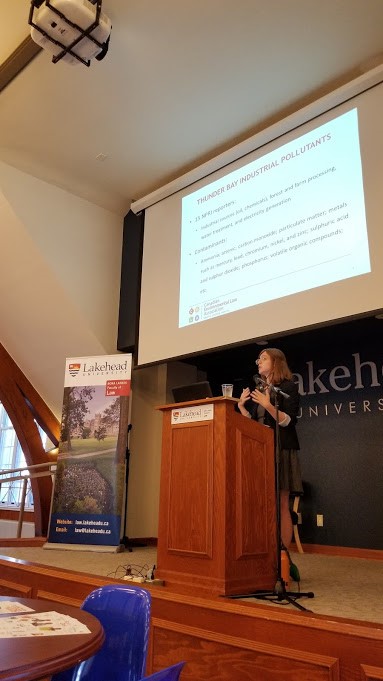
Alexandra Robertson presenting “Environmental Issues and Your Environmental Rights” at Lakehead University in Thunder Bay, ON |
| Carolyne Wang Donner Fellow
Advocacy Centre for the Elderly This summer, I worked as a Donner Fellow at the Advocacy Centre for the Elderly (ACE), a community based legal clinic for low-income seniors. ACE provides legal services and engages in law reform, focusing on areas of law that are of special importance to the senior population, such as financial abuse, improper discharge from healthcare facilities, and pension-related issues. My work at ACE involved both client intake and legal research and writing. In my client intake work, I fielded calls from potential clients to canvass their concerns and preliminarily identify legal issues for the staff lawyers. In addition to that, I also wrote a 20-page research paper regarding the duty of care of physicians when discharging elderly hospital patients safely, which will go towards assisting the staff lawyers in their day-to-day work. My research involved a comprehensive review of Ontario laws and policies, international case law and other relevant secondary literature, and the writing process involved piecing together interjurisdictional literature into a cohesive advocacy paper. Overall, I had an great learning experience at ACE. I learned a great deal about the diverse range of legal issues that affect seniors, and really enjoyed working with the friendly staff at ACE. I also developed my ability to interact with potential clients, and refined my legal research and writing skills. I am truly grateful to the Donner Fellowship for this wonderful summer opportunity. | 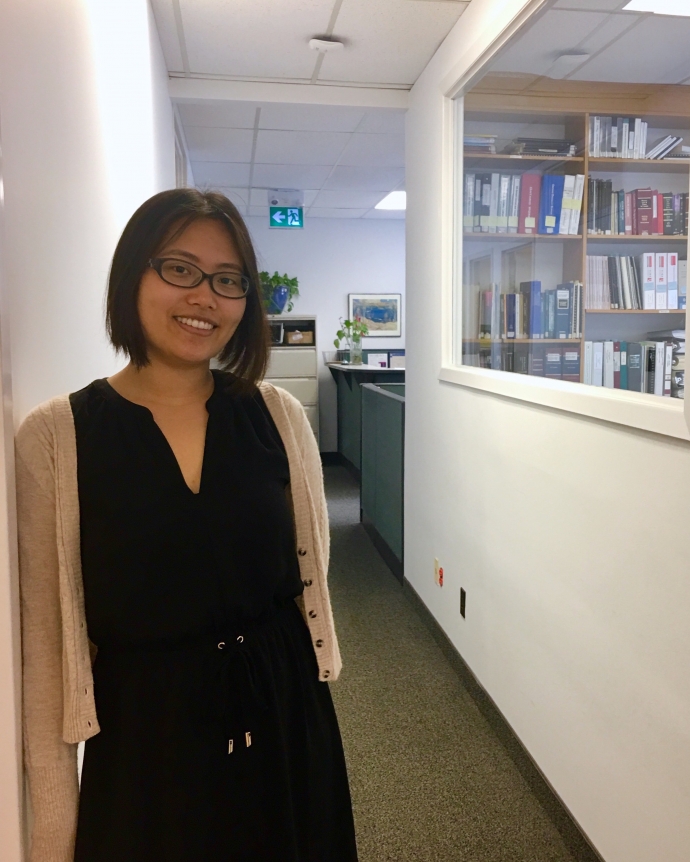
Carolyne Wang |
| Ian Sinke SLS Fellow
Christian Legal Fellowship This summer, the SLS Public Interest Advocacy Fellowship gave me funding to spend 11 weeks working for Christian Legal Fellowship (CLF) in London, ON. CLF is a national, registered charity that advocates for fundamental human rights and freedoms for all Canadians, and has developed particular expertise and experience in the area of religious freedom. At CLF, I assisted with numerous projects, including litigation files, other forms of advocacy, and legal writing. I prepared a motion record and factum for a motion for leave to intervene in a physicians’ conscience rights case being heard at the Court of Appeal for Ontario; I drafted a 10-page report on prostitution and human trafficking in Canada; and I also researched and drafted a book chapter on the relationship between the Constitution and religious charities. Besides these major projects, I also wrote countless memos and shorter answers to questions. I analyzed and wrote on two major cases which the SCC released during my tenure, Wall v Highwood Congregation and TWU, as well as writing case comments and summaries of numerous other Canadian and international religious freedom cases. Because CLF is a tiny charity, the SLS Fellowship is what made this summer possible. I am grateful to the SLS, the CDO, and the Faculty of Law for their financial and personal support of this project. I know it was a valuable experience for both me and CLF. | 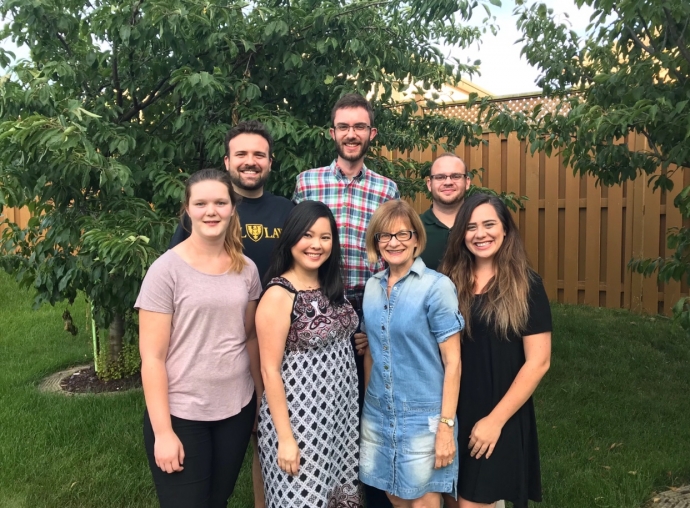
Ian Sinke |





 Amara McLaughlin-Harris on the right: The team at the Court of Appeal
Amara McLaughlin-Harris on the right: The team at the Court of Appeal

